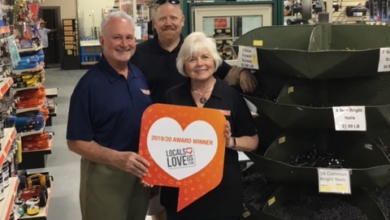Century Club Retailers Share Success Strategies
Chris Jensen & Doug Donaldson

When The Hardware Connection introduced its Century Club program with a two-part series in 2019, I was able to identify 536 hardware and LBM stores that were over 100 years old. Two years later, the Century Club now comprises 642 hardware and LBM stores, as I keep stumbling upon additional retail businesses that have hit the century mark.
All of these Century Club retailers share one additional thing in common—they have now experienced and survived two pandemics, not to mention two World Wars and a Great Depression. There have been 16 economic recessions in the last century, more obstacles for a retailer to overcome.
You will find all the Century Club hardware and LBM stores listed by state in the U.S. map. For many of these retailers, you can click on the photo icon beside their name and see a gallery of old store photos. If the store name is underlined, you can click on that hyperlink to read more about the store’s history. To visit the Century Club website, click here.
The Century Club also includes 14 wholesalers and 185 manufacturers that were founded in the United States and remain in business after 100 or more years.
As we continue to visit and write about Century Club retailers, it becomes easier to understand how these businesses have been able to survive for such a long time. They share common traits, such as the ability to change and adapt as their customers and communities change around them; the ability to take risk and innovate; and most importantly, the ability to convince the next generation of family members that keeping the legacy going is a noble and worthwhile pursuit.
On the pages that follow, read about three very different Century Club retailers who continue to thrive because they have unearthed success strategies that work for them.
Past is Present
By Doug Donaldson

Steve Shutts’ family has owned Chagrin Hardware & Supply in Chagrin Falls, Ohio, for more than 100 years.»
The routine never gets old or dull. Six days a week, Steve Shutts walks to the door of Chagrin Hardware & Supply, and with continually renewed excitement and anticipation, he slides the key into the door of a building that has been a hardware store since 1857. When he turns the key, he feels like he is unlocking another day of adventure.

Chagrin Hardware & Supply has been in the same location in Chagrin Falls, Ohio, since opening in 1857.»
You never know what you’ll find when you open a drawer at Chagrin Hardware.»
“You have no idea what’s going to happen,” Shutts says with a smile. “I go with the flow and see what happens.”
For the Shutts family, that door has opened many, many times. Steve’s parents, Ben and Jean, purchased the business in 1964, which had previously been owned by an uncle. The Shutts family has owned the store for more than 100 years. Now, Steve owns the store with his brother Jack and sister Susie.
Residents of Chagrin Falls, about 23 miles southeast of Cleveland, have counted on having a hardware store at 82 North Main Street for 164 years.
It is a store that has been a community touchstone for more than a century and could even be credited for launching the television career of one of the nation’s most famous comedic actors. In the 1950s, Chagrin Falls native Tim Conway (then known as Tom) walked past the hardware store on his way to school. At the time, the hardware store sold newfangled televisions and had them displayed in the front window. Conway would often stand in front of the store, watching the new medium until shooed away.

Fasteners can be found behind glass doors in century-old wooden cabinets, with antiques on display above. »
Unique Assortment
The Shutts family has charted its own, unique course in hardware retailing. For example, when Steve’s parents ran the store, his mother, Jean, would incorporate antiques into the store’s assortment. That aesthetic is still present today. Next to Do it Best-branded sprayers sits a vintage Underwood typewriter. On the pegboard behind cleaning products, customers can also select from a wide assortment of cast-iron, decades-old trivets.
For less vintage assortment needs, Chagrin Hardware has relied on Do it Best as its distributor for more than 55 years. Shutts says he has stayed with the co-op because they have respected the store’s somewhat eclectic, old-school vibe.

Helping customers find what they need is a long tradition at Chagrin Hardware. »
“Our Do it Best sales representative, Matt Facemire, really fits with us,” Shutts says. “He really looks at merchandising on a store-to-store basis. He knows what we’re looking for and is very responsive.”
One example Shutts points to is when the store had to change paint lines. The store’s longtime paint vendor went out of business, so Facemire helped them add the Pratt & Lambert paint line.
“It was a very smooth transition,” Shutts recalls. “We continue to offer customers a high-quality line of paint. Matt really made that easy. When I call Do it Best, they listen when we have a problem and find a solution fast.”

Many of the tools in this display were used to build the early Ohio settlements. In paying tribute to Ohio’s earliest inhabitants—the American Indian—a sign notes that the current owners’ great-grandfather, Reverend Henry Shutts, married an Ohio Southern Cherokee woman. In protest for marrying a Shutts, the rest of the tribe migrated to Kentucky.»
Local Fixtures
While some things always change, other things in the store stay the same. For example, the store still sells nails by the pound. On the same scale that weighs nails, it has become local tradition for Chagrin Falls residents to bring their newborn babies to the store to have their photos taken as they are weighed on the scale.
The store has several fixtures that have been in place for decades. The wooden flooring in the main part of the store was taken from a roller rink next door that closed in the early 1900s. Wooden shotgun cartridge cases, about a foot by a foot square, are stacked in the store’s backroom and now serve as sturdy shelves. The shotgun cartridge manufacturer names are still visible on the sides of the boxes.
In its early history, Chagrin Falls was a major manufacturing town, and a large, wooden-slatted cylinder mounted to the ceiling of the store was used to stow the long lengths of leather belting used in the machinery that harnessed water power in the nearby river. Later, that contraption was repurposed to store tubing used to connect maple sugaring taps and buckets.
In the middle of the store is a safe that has been on site since the 1800s and is so heavy that extra supports were needed to be built in the basement. The safe’s knob and handle were knocked off during a robbery attempt in the 1920s. Now, Shutts uses the safe as a sort of overwrought filing cabinet.
In the 1960s and 1970s, children had to have permission slips to buy BBs in the store. Shutts has kept a file of these slips, most of them forgeries, written on school notebook paper. “My favorite reads: ‘Johnny has my permission to buy BBs, signed Johnny’s mom,’” laughs Shutts.
“While some things change, lots of things remain the same,” he says. “The nice thing about being a small store is that we’re able to adapt. If we were bigger, there would be layers of how we buy and merchandise. We wouldn’t be able to serve the customers as well.”
For Shutts, the memorable example of the store’s buying agility was during the first Gulf War, when U.S. flag sales spiked. While other retailers sold out of flags and couldn’t restock, Chagrin Hardware was able to keep stocking and selling the red, white and blue necessities because of longstanding relationships with vendors.

An eclectic mix of antiques and oddities can be found in the store’s window displays.»
Two-way Loyalty
For the Chagrin Falls community and Chagrin Hardware & Supply, loyalty is a two-way street.
“It’s an honor to serve the community for so long,” says Shutts, apologizing for the cliche. “But it really is. Our customer base is very loyal. They’ll wait and have us order something rather than having it the next day from Amazon.”
The loyalty of Chagrin Hardware customers was on full display in January 2012, when a customer sent an email to 40 local friends suggesting shopping at the store and spending at least $20. That email was forwarded even more and then became a viral event. During the designated day, a steady stream of customers poured into the store, and several customers called the store to place orders. By 10 a.m., the store was packed with customers from the “cash mob” and at 1:30 p.m., the store’s credit card machine was overloaded and needed to be reset.
With more than a century of family expertise, Shutts shares this one word of advice for other independent retailers: “Listen.”
To serve the community by remaining independent, he credits listening to customer requests, projects and responses to changing trends. Shutts cites the store’s light bulb assortment as a prime example of how he has listened and responded to customers. Customers requested energy-efficient alternatives to incandescent light bulbs, which led to the store stocking a large selection of LED bulbs.
Shutts says he always keeps his ears open for new ways to serve his customers.
“We see more women customers than men,” he says about the store’s demographics. “They’re really good at steering us into picking up new products or services.”
Known for screen repair, the store added lamp repair a few years ago based on customer requests. That service has become a strong niche for Chagrin Hardware. Electricians even drop off lamps from their customers.
As he fields new product suggestions, Shutts has an eye to the next generation of store owners—there may be nieces and nephews who may take over—but for the moment, he is still thrilled every time he slides the key in the front door and unlocks another day of…who knows?
100 Acts of Service
By Chris Jensen

HPM Building Supply owner-employees pack meals at the Hawaii Food Basket as part of the 100 Acts of Service initiative to commemorate the company’s centennial anniversary this year.»
HPM Building Supply, which just joined the Century Club this year, has reached the halfway mark of its pledge to complete 100 Acts of Service to mark its centennial anniversary. Through partnerships with non-profit and service-based organizations, HPM owner-employees are fanning out across the state to give back to the communities that have supported HPM for a century.

Miyake-HPM owner-employees collect keiki mask donations on Maui.»
“As we mark our centennial anniversary, HPM owes so much of our success to the communities that have supported us,” says Jason Fujimoto, president and CEO of the fifth-generation, family-run business. “These 100 Acts of Service are our way of showing appreciation and giving back—especially as our communities continue to recover from the pandemic. We look forward to strengthening connections through these service projects and continuing our commitment to a more resilient, sustainable Hawaii.”
The 100 Acts of Service initiative is led by a group of 22 owner-employees who serve as Community Building Team Champions. They organized more than 50 projects, which owner-employees from across the state have completed. HPM’s goal is to complete 100 Acts by the end of the year.

HPM is rewarding 100 customers with an HPM bucket, each filled with a $100 HPM gift card and $200 or more in sponsored gifts and/or merchandise. Ten lucky winners are announced every month from January through October. »
Completed projects include collecting diaper donations for the Hawaii Diaper Bank, volunteering at the Hawaii Food Basket, organizing beach and park cleanups, and donating renovation supplies to organizations in need.
Founded in 1921 as Hawaii Planing Mill, HPM Building Supply is also marking its 100th anniversary with giveaways and other initiatives across its 14 locations on Hawaii Island, Kauai, Oahu and Maui.
“HPM’s founding values of integrity, respect and continuous improvement in pursuit of excellence still embody who we are today. As we move forward, our core values of heart, character and growth will push us to work even harder to create a more resilient, sustainable Hawaii,” says Fujimoto.

Mike, Bobby and Jason Fujimoto represent three generations of their family to run HPM Building Supply. Bobby passed away in 2020 at the age of 93.» HPM’s Hilo store was destroyed by a tsunami in 1946.»
HPM’s Hilo store was destroyed by a tsunami in 1946.»
HPM Building Supply’s 14 stores include this location in Kona.»
HPM pioneered metal roofing in Hawaii in 1963.»
HPM Building Supply Through the Years
1921 — Hawaii Planing Mill Ltd. Is founded by local contractors Kametaro Fujimoto and Sanzo Kawasaki.
1929 — Fujimoto’s son, Barney, becomes GM and adds paint, plumbing and hardware products.
1946 — A tsunami destroys most of the store.
1954 — Barney’s son, Bobby Fujimoto, is named president.
1959 — Kona branch opens as Captain Cook Building Supply.
1959 — HPM establishes one of Hawaii’s first employee profit-sharing plans.
1960 — A tsunami destroys HPM’s Hilo facility.
1961 — HPM opens Hilo Home Design Center.
1977 — HPM creates ones of Hawaii’s first Employee Stock Ownership Plan (ESOP).
1983 — HPM opens the Waimea branch and all 3 branches unite as HPM Building Supply.
1992 — Bobby Fujimoto retires and son Mike becomes president.
1992 — Keaau facility opens as home to HPM’s manufacturing operations, offices and lumberyard.
1996 — New Hilo store opens.
1997 — HPM Custom Metal Roofing opens sales office and warehouse in Honolulu.
1998 — HPM’s Kitchen & Bath Showroom opens in Hilo.
2001 — HPM Kona moves to new location with Hawaii’s first drive-through lumberyard.
2005 — HPM opens a distribution center in Keaukaha.
2006 — HPM becomes 100% owned by its ESOP.
2008 — HPM doubles the size of its Waimea branch.
2010 — HPM begins manufacturing wood wall panels.
2011 — HPM acquires Kauai Lumber.
2015 — HPM adds second Kauai location in Kapaa.
2016 — Mike’s son Jason becomes president and COO.
2017 — Kona store gets a $3 million remodel.
2020 — HPM merges with Maui-based Miyake Concrete.
2021 — HPM launches a year-long celebration of its 100th anniversary.
A Shining New Star
By Chris Jensen
 Curtis Lumber’s Sidney, N.Y., location reopened in July 2020 after undergoing a major transformation.»
Curtis Lumber’s Sidney, N.Y., location reopened in July 2020 after undergoing a major transformation.»
Even before Curtis Lumber opened its Sidney, N.Y., location in July 2020, the store was embraced by the local community.
“From the minute we announced we were coming to this town, chamber members and town officials got behind it and asked how they could help and support us,’” says Manager Bill Cairns.
The store joins the Curtis Lumber family, one of 23 stores throughout New York and Vermont. Elmer Curtis founded Curtis Lumber Company in 1890, and the business is currently owned by Jay Curtis, Elmer’s great-grandson.

Bill Cairns, manager of Curtis Lumber’s Sidney, N.Y., store, has been a visible presence in the community, delivering donated materials to local groups.»
The sales counter and checkout are purposely placed so employees can easily greet customers as they come into the store.»
Before it opened, Cairns says the Sidney store underwent a major transformation, with design and layout assistance from Orgill. The former lumberyard was taken down to the studs and rebuilt from the ground up with all-new plumbing, electrical, heating, ceiling and flooring. All shelving was set tall to enhance the amount of product located at eye level.
They replaced well-worn tongue and groove cedar siding on the storefront with a Versetta Stone facade that welcomes customers and showcases an example of the Versetta products the store sells. The new aisle and department signs on the nearly 10,000-square-foot sales floor have a sleek, modern look and create a cohesive look for the Curtis Lumber brand.
“We hear on a daily basis from customers how amazed they are at the difference,” Cairns says. “If you would have seen what this place looked like when we bought it versus what it looks like today, that in itself is a success story.”
Along with its appearance, the store’s performance has improved, with profit margins up 3 to 5 percent and overall customer count up 10 percent month over month. Store sales are 33 percent more than what the company forecasted for the first year.
“The store has exceeded projections every month, and sales have grown as the community has learned about the new Sidney store,” Cairns says. “Profitability throughout COVID-19 has been strong everywhere, and this store has been no exception.”
All Curtis Lumber locations focus on selling the whole project, including decks, kitchens and flooring, and the Sidney location also has everything customers need to see a project through from beginning to end. The Sidney store has already seen success in paint, electrical, plumbing, seasonal and power tools, and plans to continually remerchandise to bring in new products. Strong niches include ceiling fans specialty lighting and cleaning supplies.
“We’re a year in and it’s still rare for a day to go by without someone saying what a nice-looking store we have,” Cairns points out.
All Curtis Lumber employees, including the eight employees at the Sidney store, go through a full week of training before starting their roles, and are also assigned a mentor.
“The mentors help new employees learn about our culture and systems over their first 90 days,” Cairns says. “This helps set them up for success as a member of the Curtis Lumber family.”
The Sidney staff was hired in February and since COVID delayed the opening by a few months, they ended up working in other Curtis locations to gain experience, according to Cairns.
In its first year of business, the Sidney store even took part in a customer-favorite companywide event, Petapalooza, hosted at several Curtis Lumber locations. It brings together local animal shelters and rescue groups for a pet adoption day and shares photos from the event on social media.
The event is just one example of how the Sidney store is already making a positive impact in the community. Store employees bought cat food and cleaning supplies out of their own pockets and donated the goods to the Delaware Valley Humane Society after the shelter took in 91 cats from one household.
“Right from the get-go, I could see the community pride shown in this area and the way residents come together and get behind each other,” Cairns says. “We’re proud to be a small part of it.”
He adds, “We would hear comments that ‘this is where I’ll shop from now on because you’re all wearing masks.’ People will remember how you make them feel.”
Innovative retailing concepts are focused on technology. Customers can take a virtual tour of the showroom online via the Curtis Lumber website. Curtis Lumber utilizes AI (artificial intelligence) technology to sort and respond to web leads to get a customer’s information faster while they wait for a response from a Curtis Lumber salesperson.

Curtis Lumber held a grand opening for its new store in East Greenbush, N.Y., on June 25.»
Curtis Lumber’s new store in East Greenbush, N.Y., features a 25,500-square-foot sales floor that is 7,500 square feet larger than the store it replaced.»
More Store Openings
On June 25, Curtis Lumber held a grand opening for a new, larger store in East Greenbush, N.Y. The rebuild features a 25,500-square-foot store on 12 acres—7,500 square feet larger than the store it replaces. The old store was repurposed to serve as a warehouse.
The East Greenbush store now features a much larger showroom that can display expanded assortments of lighting, windows and kitchen products.
In January 2020, Curtis Lumber opened a new, remodeled store in Richmondville, N.Y., a business that had been acquired as the same time as the Sidney store in August 2019.

The Hardware Connection is a digital magazine targeted to independent hardware/home improvement retailers. It is the only industry magazine designed and distributed solely in electronic format and currently reaches over 60,000 people in the two-step channel.
The Hardware Connection publishes four Newsletters each year in addition to eight magazine issues.
To sign up yourself or additional staff to a free subscription to receive The Hardware Connection magazine and newsletter in electronic format, please click here.







